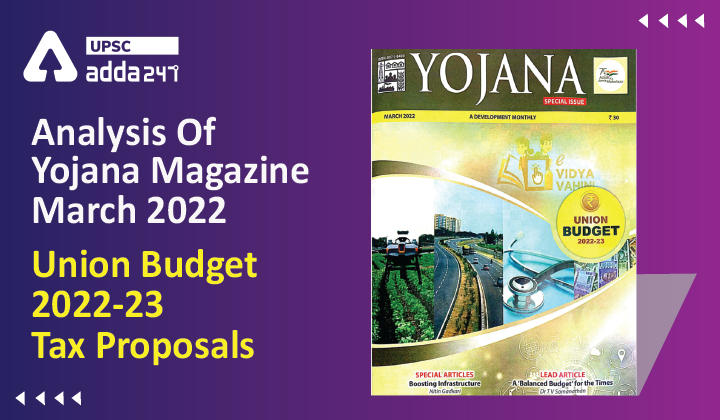Table of Contents
Analysis Of Yojana Magazine: ”Union Budget 2022-23 – Tax Proposals”
Relevance
GS 3:Growth & Development, Planning, Government Budgeting, Inclusive Growth
Introduction
- The importance of tax proposal is to simplify the tax system, promote voluntary compliance by taxpayers, and reduce
litigation. - The Union Budget 2022-23, while continuing with the declared policy of stable and predictable tax regime, intends to bring more reforms that will take ahead the vision to establish a trustworthy tax regime.
Proposals relating to taxes and duties
- On the Direct Tax side, the budget allows taxpayers to file updated income tax returns within 2 years for correcting errors. It also provides tax relief to persons with disability.
- The budget reduces the Alternate minimum tax rates and surcharge for cooperatives. As an incentive for startups, the period of incorporation of eligible startups has been extended by one more year.
- The budget proposes to increase the tax deduction limit on employers’ contributions to the NPS account of state government employees to bring parity with central government employees.
- Income from the transfer of virtual assets will be taxed at 30%. The budget proposes better litigation management to avoid repetitive appeals.
- Extending the period of incorporation of the eligible start-up by one more year, that is, up to 31.03.2023 for providing such tax incentive.
- To provide equal treatment, the budget proposes to increase the tax deduction limit from 10 per cent to 14 per cent on employer’s contribution to the NPS account of State Government employees as well.
- It also provides tax relief to persons with disability. The budget also reduces the Alternate minimum tax rate and surcharge for cooperatives
- Income from the transfer of virtual assets will be taxed at 30%. The budget proposes better litigation management to avoid repetitive appeals.
- In an effort to establish a globally competitive business environment for certain domestic companies, a concessional tax regime of 15 per cent tax was introduced by the government for newly incorporated domestic manufacturing companies.
Better Litigation Management
Taking forward the policy of sound litigation management, the budget provides that, if a question of law in the case of an assessee is identical to a question of law which is pending in appeal before the jurisdictional High Court or the Supreme Court in any case, the filing of further appeal in the case of this assessee by the department shall be deferred till such question of law is decided by the jurisdictional High Court or the Supreme Court, which will greatly help in reducing repeated litigation between taxpayers and the department.
Conclusion
The prolonged tax litigation is hampering genuine resolutions, contract enforcement, failing in attracting foreign investments, and most importantly, clogging the due tax collections, which in turn increases the legal costs to both taxpayers as well the Government. A great extent of coordination between the Government, the Judiciary, and the Taxpayer would pave the way for addressing the ‘Law’s in Ordinate Delays’.



 TSPSC Group 1 Question Paper 2024, Downl...
TSPSC Group 1 Question Paper 2024, Downl...
 TSPSC Group 1 Answer key 2024 Out, Downl...
TSPSC Group 1 Answer key 2024 Out, Downl...
 UPSC Prelims 2024 Question Paper, Downlo...
UPSC Prelims 2024 Question Paper, Downlo...
